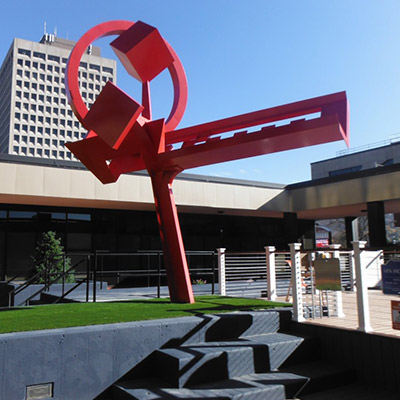Novo chose a program of Respighi’s Fountains of Rome, Elgar’s tone poem In the South and Shostakovich’s Symphony No. 6 in B minor, Op. 54. The common thread among the works — all by composers incredibly skilled at writing orchestral music — is that each piece created paintings in sound and color.
Fountains of Rome depicted four iconic tourist spots at different times of day. A myriad of instruments painted bird songs and rising damp mists; processions of seahorses, sirens and naiads; cascading jets and shimmering surfaces of water. At the end of the last movement, tolling bells led us into the silence of night.
In the South was inspired by a Elgar’s vacation in Alassio on the Italian Riviera in 1903. The opening theme, which the composer described as “joy of living (wine and macaroni),” was followed by melodies recalling the ruin of a Roman bridge, a shepherd’s song (played beautifully by violist Martha Brody), views of an awe-inspiring church and militaristic memories of past wars that marched across and marred the landscape.
The Shostakovich symphony a total surprise to me. I expected another bombastic and propaganda-laden work required of the composer by the Soviet regime. Instead, the novel three-movement work began with a very long, mesmerizing lament thought to express Shostakovich’s disillusionment with communism. Highlights included a heart-wrenching funeral march intoned by the English horn and the poignant flute bird song played perfectly by Georgetta Maiolo.
But then the symphony moved into a ribald joke of a scherzo, a short movement ending with a glissando into thin air by the horns and clarinets. And if that wasn’t surprising enough, the final movement was a gallop – a wild ride, a circus band on amphetamines, a surrealistic carnival with crazy rhythms and tempos and fiendishly difficult licks by Concertmaster Uli Speth and virtually every principal musician in the orchestra. Take that, Stalin, Lenin and the whole Soviet hierarchy!
I should single out and applaud every orchestra member who played one of those sparkling solos at the Osterhout Concert Theater, but rather than present a long list and perhaps leave anyone out, let me say — hats off to the whole lot of them.
While the spirit moves me, and with Novo’s assurance that next season will top this one (if possible!). I’m renewing my subscription now for next year. My only wish: that all the concerts would be scheduled for Saturday nights. There are just too many conflicts at other music/theater venues on Sunday afternoons.




































